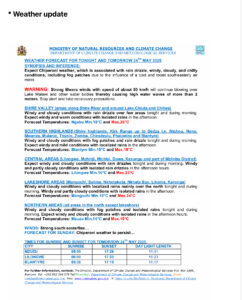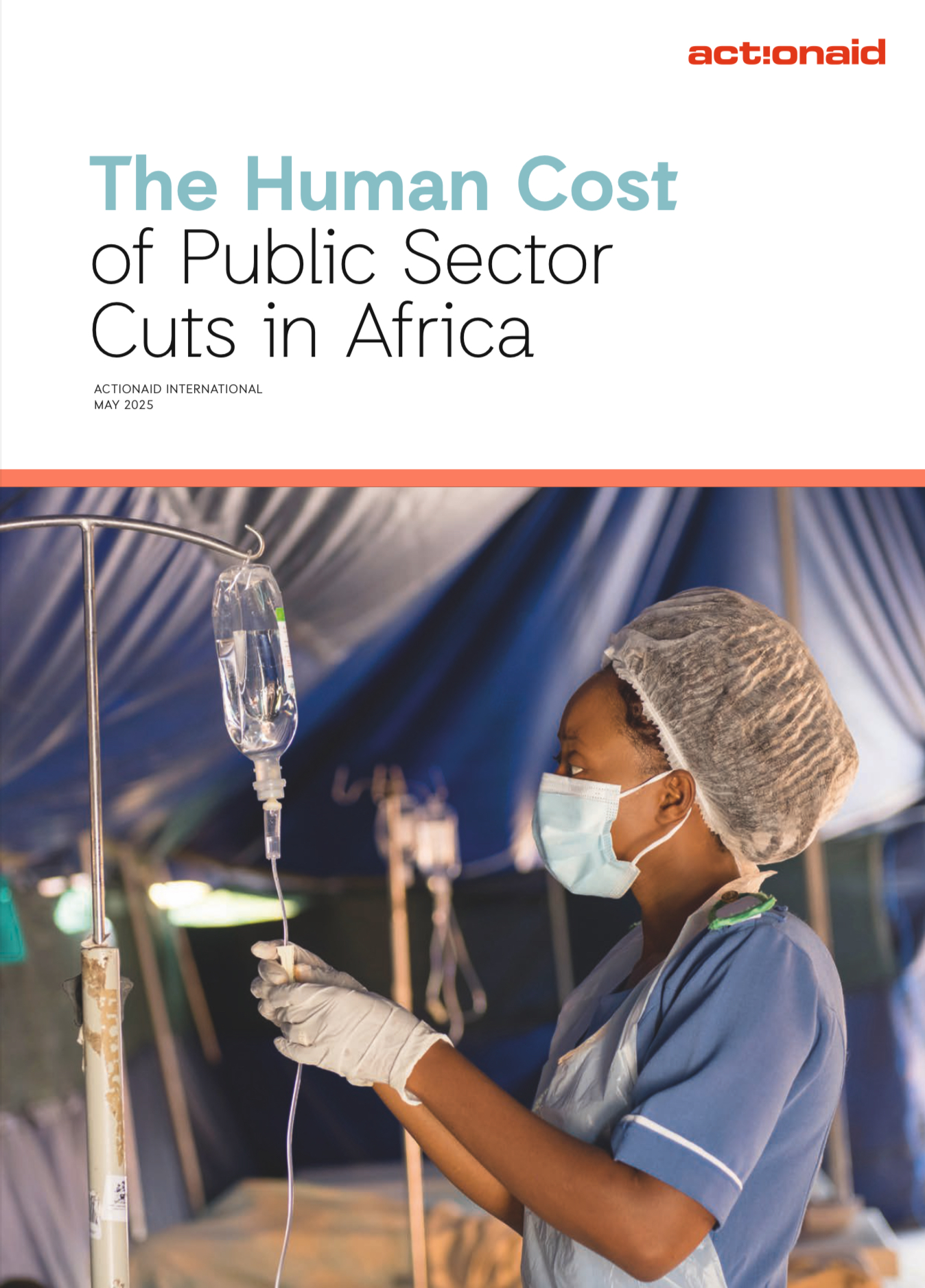
* They should demand the democratisation of decisions on debt relief and cancellation, with the creation of a UN Framework Convention on Sovereign Debt, and support the UN Framework Convention on Tax
* They should also prioritise the substantive gender equality commitments made in the groundbreaking Beijing Declaration and Platform for Action — 30 years old this year – by ensuring that women’s rights are upheld in economic policy
By Duncan Mlanjira
In the recent research released this month by ActionAid International, entitled; ‘The Human Cost of Public Sector Cuts in Africa’, — drawn from a survey conducted through interviews and focus group discussions in six African countries, Malawi, Ethiopia, Ghana, Kenya, Liberia and Nigeria — highlights how over the last five years, austerity measures have led to the deterioration of public health and education services.
Advertisement
In its executive summary, the report says the research involved 616 individuals in rural and urban locations (296 health workers and teachers and 320 service users), which “reveals that a decline in the quality and availability of services has stretched frontline health workers and teachers thin, and threatened the rights of communities”.
“Health workers and teachers are facing overwhelming workloads and fewer resources to perform their jobs effectively, while communities are deprived of public services due to high costs and poor quality.”
Thus, the report after analysing its findings, calls for immediate actions from the International Monetary Fund (IMF), the governments from the six debt-ridden countries and their health and education ministries, to address the dire situation of public services.
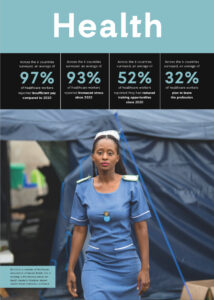
“We urge the IMF to stop imposing austerity measures and privatisation, and focus instead on progressive tax reforms and debt relief or cancellation to increase government revenues for greater investment in public services.
“National governments should reject coercive IMF policies, seek debt relief or cancellation, and expand tax revenues in fair ways to rebuild public health and education workforces and infrastructure.
“They should demand the democratisation of decisions on debt relief and cancellation, with the creation of a UN Framework Convention on Sovereign Debt, and support the UN Framework Convention on Tax.
“They should also prioritise the substantive gender equality commitments made in the groundbreaking Beijing Declaration and Platform for Action — 30 years old this year — by ensuring that women’s rights are upheld in economic policy.
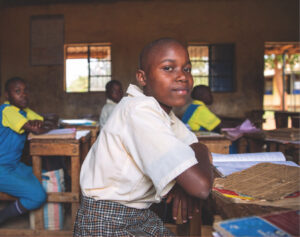
Students in class at a primary school in Makueni County, Kenya.—Picture credit: Sarah Waisha/ActionAid
“Education ministries should collaborate with finance ministries to ensure that at least 20% of national budgets are allocated to education, in line with global benchmarks. They should ensure there are sufficient numbers of trained and qualified teachers, who are fairly remunerated and have access to professional development and support to reduce the burden of unpaid care work that falls — particularly on women teachers.
“There is also a need to ensure that schools are gender responsive and inclusive and to focus on increasing funding to build more schools, improve school infrastructure and ensure learning materials that are accessible for all learners including those with diverse needs.
“Health ministries should work with finance ministries to ensure the achievement of the Abuja Declaration benchmark of allocating 15% of national budget towards healthcare.

Advertisement
“They need to recruit more health workers, ensuring they are fairly remunerated, allocate more resources to public health facilities, improve healthcare infrastructure, and provide mental health support for workers.”
ActionAid International emphasises that the measures “aim to create a more equitable and effective public service system, in line with States’ human rights obligations and the Sustainable Development Goals (SDGs) — to serve the needs of communities better”.
These recommendations were based on the survey findings in the six countries, as follows:
Stretched Thin: Public Health Workers and Teachers
The survey exposes the worsening conditions faced by health workers and teachers over the past five years.
Across both sectors, financial hardships have left workers struggling to meet basic needs. Across the six countries, 84% of all teachers surveyed reported a drop in real income of between 10% and 50% since 2020, while 97% of health workers describe their wages as insufficient to cover rent, food and household expenses.
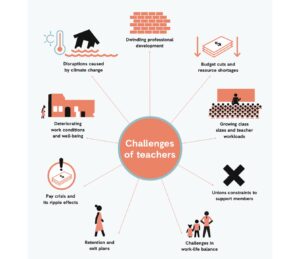
These financial pressures are compounded by soaring workloads. Rising student and patient numbers, combined with cuts in the public budget, have left 70% of teachers and 85% of health workers feeling overwhelmed.
Teachers face classrooms packed with up to 200 students, while health workers confront long queues and patient delays due to equipment and medicine shortages. Women experience the heaviest burdens, especially with maternal care services being stripped to the core. The crisis has taken a significant toll on mental wellbeing, with 89% of teachers and 95% of health workers reporting stress-linked to financial instability and excessive workloads.
Cuts to public budgets since 2020 have slashed essential funding. In the education sector, 87% of teacher respondents cite a shortage of essential classroom furniture and reduced access to teaching materials and 73% of education sector workers have had to purchase resources themselves.
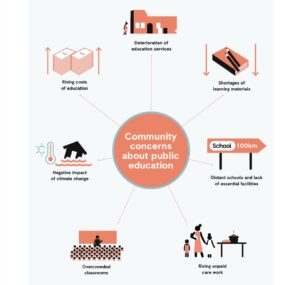
Meanwhile, 87% of health workers report a scarcity of medical equipment and supplies due to insufficient budgets, and 84% report severe shortages in staff, leading to longer wait times and a decline in service quality.
Unions that advocate for these workers face their own limitations due to restrictive policies and funding shortages, while training opportunities — especially for women and rural workers — have dwindled.
The consequences of these systemic failures are far-reaching. The strain on health workers and teachers jeopardises service delivery, raises attrition risks, and compromises the wellbeing of workers and their families.
This emphasises the urgent need for reforms in pay, workloads, infrastructure and training, to save these essential public services.
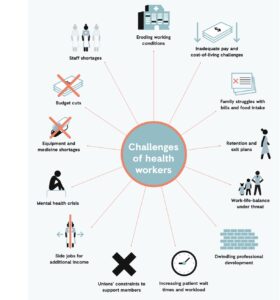
Appalling State of Public Services
A growing crisis in public healthcare and education is pushing communities to the brink. Insights from both rural and urban communities reveal that chronic shortages of health professionals, rising costs, and crumbling infrastructure are forcing many to forgo essential health services.
Urban residents highlight exorbitant doctors’ fees, long waits, and costly diagnostics, while rural communities have the additional burden of long travel distances and high transport costs, and face increasing climate-related disruptions.
Community members/respondents reported that women and girls are the most affected by rising health cost due to increased caregiving responsibilities, bearing the heaviest load and reduced access to maternal care.
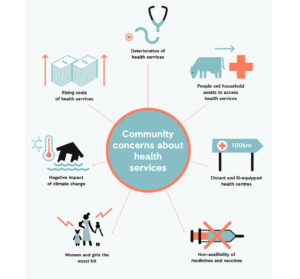
The education sector tells a similarly grim story. Overcrowded classrooms, particularly in urban areas where class sizes can swell to 200 students, leave children with little chance for quality learning.
Shortages in staff and educational resources are widespread, and the absence of water, electricity and safe school facilities further diminishes the learning environment.
Rural students can endure long commutes, while urban students often struggle with safety issues on their way to school. As both urban and rural families struggle to afford rising education costs, this often has a disproportionate impact on girls, as they are often the first to be withdrawn from school.
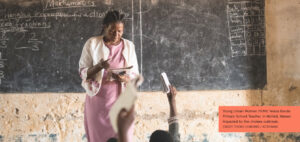
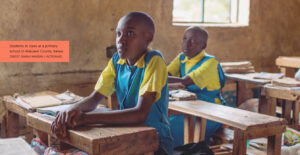
As public services deteriorate, the unpaid care burden on women and girls is surging. Women in urban areas report shouldering an additional 20 to 28 hours of care work each week, similar in rural households.
Time that could be spent on rest or recreational, economic or educational pursuits is consumed in subsidising and navigating the breakdown of essential public services through increased childcare and caregiving for sick family members, without supportive public sector systems.
Decreased government investment in public health and education shifts the burden onto individuals, forcing users to bear rising costs — the most regressive way to finance public services.
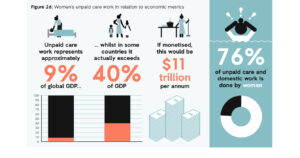
Communities criticise government mismanagement and regressive taxation policies that under-tax the wealthiest individuals and corporations while over-taxing ordinary people.
The call for change is clear — fund essential public services through progressive taxation measures, recruit more health workers and teachers ensuring they earn a living wage, and build climate-resilient infrastructure.
Without these reforms, the decline of critical public services will only deepen the cycle of inequality and suffering.
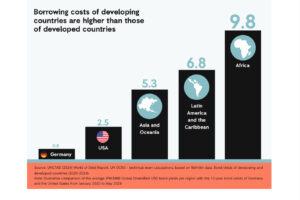
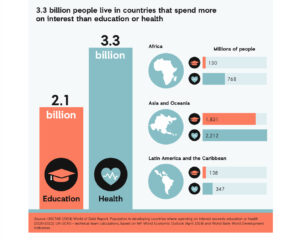
Debt Repayment Leaves Services Chronically Under-Resourced
Overall, this new report from ActionAid highlights the lived impact of austerity-driven public sector wage bill cuts and privatisation, drawing on compelling new evidence of the chronic under-resourcing of health and education services in the six African countries.
This is happening in the context of reductions in government expenditure and the prioritisation of debt repayments, justified by the goal of gross domestic product (GDP) growth at any cost.
In the current climate of aid cuts and geopolitical instability, we can only expect this trend to be exacerbated.
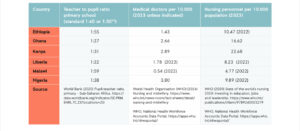
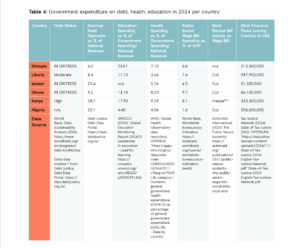
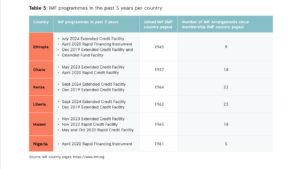
The executive summary concludes that capturing the perspectives of the 616 frontline workers and community members, the research reveals public education and healthcare services are “plagued by staffing shortages, inadequate infrastructure, and financial barriers — leading to violations of people’s rights to health and education”.
“Women and marginalised groups face the greatest burden, with increased unpaid care work and restricted access to essential services. There is an urgent need for reforms to end austerity, recruit more workers, pay them a living wage, upgrade infrastructure, and ensure health and education systems are gender-responsive.
“The findings of this report point toward the detrimental impact of cuts in government spending on essential sectors, influenced by international financial institutions such as the IMF on the health and education sectors.


Advertisement
“ActionAid calls for transformative change in how economic policy is governed internationally, and ensuring decisions are made inclusively and democratically, to ensure feminist and just alternatives, prioritise human rights, tax justice, climate justice, and value care over GDP growth.”
In its background, ActionAid International explains that for decades, has been at the forefront of research into the impact of IMF austerity recommendations in relation to public sector wage policies on spending on public services.
“This research has highlighted the gendered impacts of austerity, and leads us to hold the IMF responsible for 50 years of failed economic policy, particularly in Africa. “We have also documented the impact of the growing debt crisis on health and education spending, their gendered impacts and the compounding effect of the climate crisis.”
